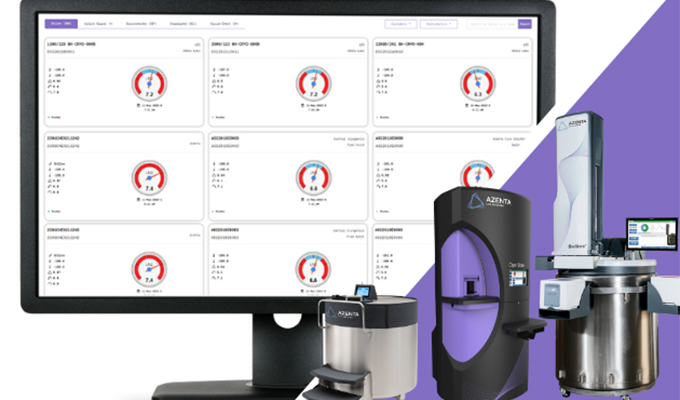Part 1 of our Bridging the Gap Series (Summary of the webinar session held in November 2023)
Azenta and The Emily Whitehead Foundation have joined forces to launch an impactful new webinar series titled “Bridging the Gap.” The series aims to establish connections between scientific advancements, the biotechnology industry, and patient care, with the ultimate goal of advancing cancer immunotherapy treatments and helping patients access cutting-edge therapies. The first session, held on November 3, reflected on the past decade of advanced therapies for cancer patients.
The webinar featured guest speaker Stephan Grupp, MD, PhD, Chief of the Cell Therapy and Transplant Section at the Children’s Hospital of Philadelphia (CHOP), and co-host Tom Whitehead, who discussed the foundation’s support for cancer immunotherapy treatments and connecting patients to clinical trials. Additionally, a family shared their journey with their daughter, Ailani, who battled leukemia and explored various treatment options, including CAR T-cell therapy, with support from the Emily Whitehead Foundation and Dr. Stephan Grupp’s team at CHOP.
A panel discussion rounded out the event, featuring Al Ribickas, Assistant Director of Cell Therapy Facility Operations at the Moffitt Cancer Center; Patrick Hanley, PhD, Associate Professor and Chief & Director of the Cellular Therapy Program at Children’s National Hospital; and co-host, Gil Edwards, Senior Director at Azenta. Together, they delved into critical themes surrounding cancer immunotherapy, including the importance of collaboration and ongoing efforts to drive the field forward.
Addressing Barriers to Clinical Trial Access
Central to the discussion was the considerable challenge patients face when attempting to access clinical trials, particularly for advanced therapies like cancer immunotherapy. The Emily Whitehead Foundation was celebrated for its tireless efforts in ensuring that patients have access to legitimate and FDA-approved clinical trials. A significant contribution from the foundation is the creation of TrueTrials.org — a platform aimed at helping patients and their families identify recommended clinical trials. This initiative plays a pivotal role in ensuring that patients are not misled by unverified stem cell or other clinical trial listings, and can confidently explore legitimate trial options.
During the discussion, several barriers to accessing advanced therapies emerged. These included the financial burden of treatment, the lack of awareness regarding available clinical trials, and the necessity for patients to travel to major medical centers for treatment. These barriers collectively limit the number of eligible patients who can benefit from these cutting-edge therapies. Furthermore, for many patients and their families, logistical issues related to traveling to specialized medical centers can be a significant obstacle.
The Importance of Education and Collaboration
The discussion underlined the importance of educating patients and their families to make well-informed decisions about their treatment options. Effective educational efforts can help patients navigate the complex landscape of advanced therapies and clinical trials. In addition to patient education, there is a pressing need to educate smaller cancer centers and oncologists about the benefits and availability of advanced therapies earlier in the process. This broader education initiative will ensure that patients have equal opportunities to access these innovative treatments, regardless of their location.
Challenges in the Field of Advanced Therapies
The panel discussion addressed both the progress and challenges experienced by the field of advanced therapies over the past decade. Key points highlighted in the discussion included:
- Streamlined Approval Processes: Clinical trial approval processes have improved, with a focus on saving lives and reducing scientific objectives. This has led to an increase in available trial options.
- Automated Manufacturing: The development of automated cell manufacturing solutions helps reduce the risk of errors by defining systems and creating processes that are adaptable, repeatable, and scalable. Strong partnerships and technologies will bring rigor and reproducibility as therapies advance toward approval.
- Shortened Manufacturing Time: Efforts to accelerate the manufacturing of cell therapies have led to significant improvements, reducing the time needed to produce these therapies.
- Insurance Approval: Streamlining the insurance approval process can improve patient outcomes by shortening critical waiting periods for life-saving treatments.
- Focus on Pediatric Patients: The field initially gained momentum in pediatric cancer treatments and should continue to prioritize treatments for children with cancer.
- Standardization: Standardizing processes, equipment, labware, delivery and manufacturing within the cell therapy field is crucial for reducing inefficiencies and errors by driving quality and consistency. Implementing standardized operating procedures which are scalable and support cell and gene therapy (CGT) manufacturing are critical to success.
Regulatory and Insurance Challenges
Regulatory and insurance challenges continue to be obstacles in the adoption of advanced therapies. Although the regulatory landscape has improved, challenges remain, especially for mid-sized and smaller healthcare facilities.
Insurance issues persist, with some favoring in-state or network-based treatment, potentially limiting access to specialized centers. The discussion highlighted this opportune time for CGT manufacturers to engage in a dialogue with insurers, sharing the advantages of CGT therapies, such as CAR T-cell therapy, over conventional cancer treatments.
Overall, the legal and regulatory environment for advanced therapies has improved, but challenges remain in ensuring broader access, standardization, and overcoming insurance barriers. There is a particular focus on reducing the regulatory burden, especially for smaller healthcare facilities, to make these innovative therapies more accessible to patients.
A Shift in Timing for Clinical Trials
A significant shift in the timing of patient admission to clinical trials has occurred, with earlier interventions offering better chances of success and reduced risks. Historically, doctors often kept patients in reserve until they had exhausted all other treatment options or required hospice care. However, the field has witnessed a significant transformation in this regard, thanks to lessons learned from early experiences like Emily Whitehead’s case.
Today, healthcare providers intervene at an earlier stage in the treatment course. They recognize that the more advanced the disease, the more aggressive the treatment needs to be. By initiating treatment earlier in the disease’s progression, there is a better chance of success, all while reducing the risks associated with severe disease progression.
Additionally, there have been remarkable advancements in the management of cytokine release syndrome (CRS), a potential side effect of cell therapies. New drugs are now available for managing CRS, providing more options for patient care and making these therapies even safer and more accessible.
New Treatments on the Horizon
Ongoing research and development efforts focus on new treatments for various conditions, including pediatric neuroblastoma and brain tumors. The commitment to advancing cell-based therapies remains strong.
The Children’s Hospital of Philadelphia (CHOP), in particular, is at the forefront of groundbreaking research and treatments in the field of cancer immunotherapy. Their efforts include the development of a second-generation Kymriah approach to optimize CAR T-cell therapy, with the goal of reducing the risk of the patient’s immune system attacking the cells. While the results show promise, they await official publication.
CHOP is also exploring the potential of using multiple targets for CAR T-cell therapy, recognizing that a single target may not always be sufficient, especially if the original target (such as CD19) is no longer present in cases of recurring leukemia. They are actively engaged in clinical trials to address the challenges of treating solid tumors, including pediatric neuroblastoma.
This multifaceted approach exemplifies CHOP’s dedication to advancing cell-based therapies across a spectrum of diseases while continually improving the safety and efficacy of these treatments.
Continuing the Discussion
The “Bridging the Gap” webinar series has made an inspiring start by offering a platform for experts and advocates to share their experiences, challenges, and successes in the field of cancer immunotherapy. By connecting science, industry, and patient care, this series holds the promise of driving further advancements and breaking down barriers to access advanced therapies, providing hope to countless patients and their families on the path to a healthier future.
Subscribe to the series to get invited to the next webinar, and to listen to the full recording.
Explore more in the Bridging the Gap Series










